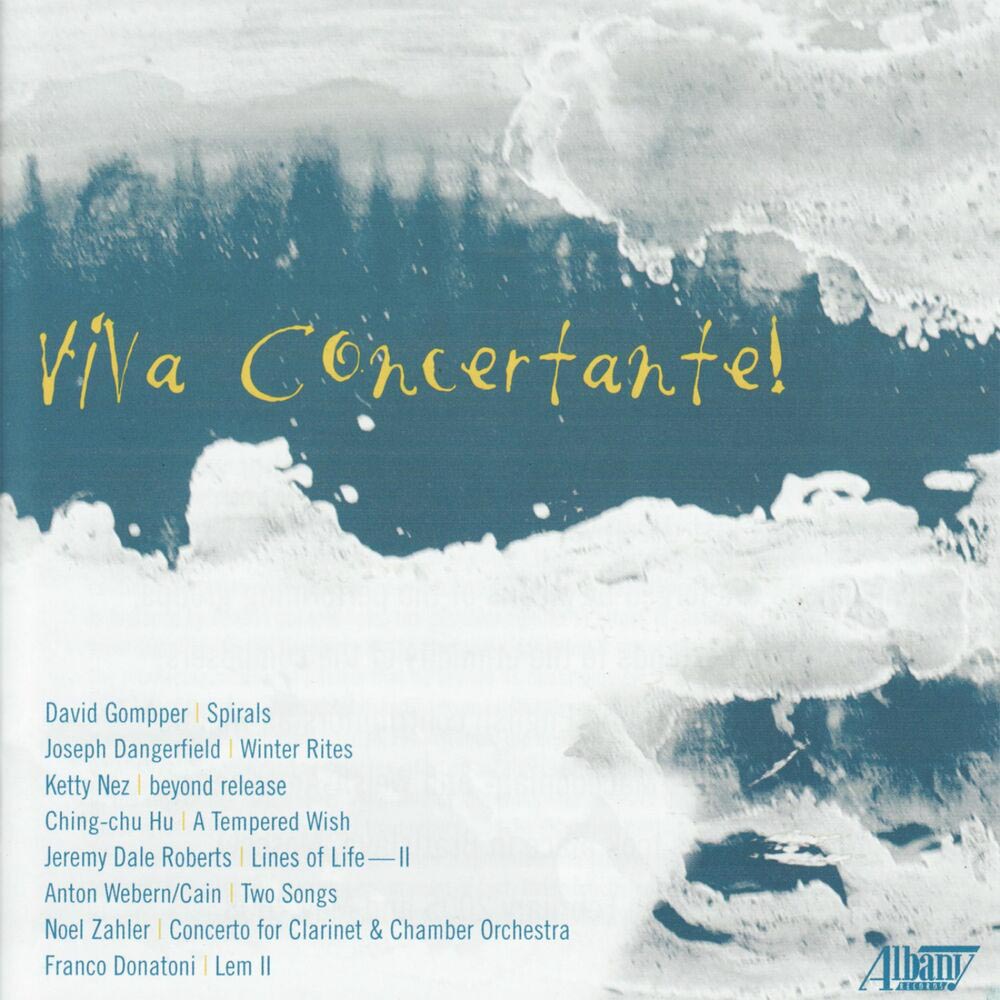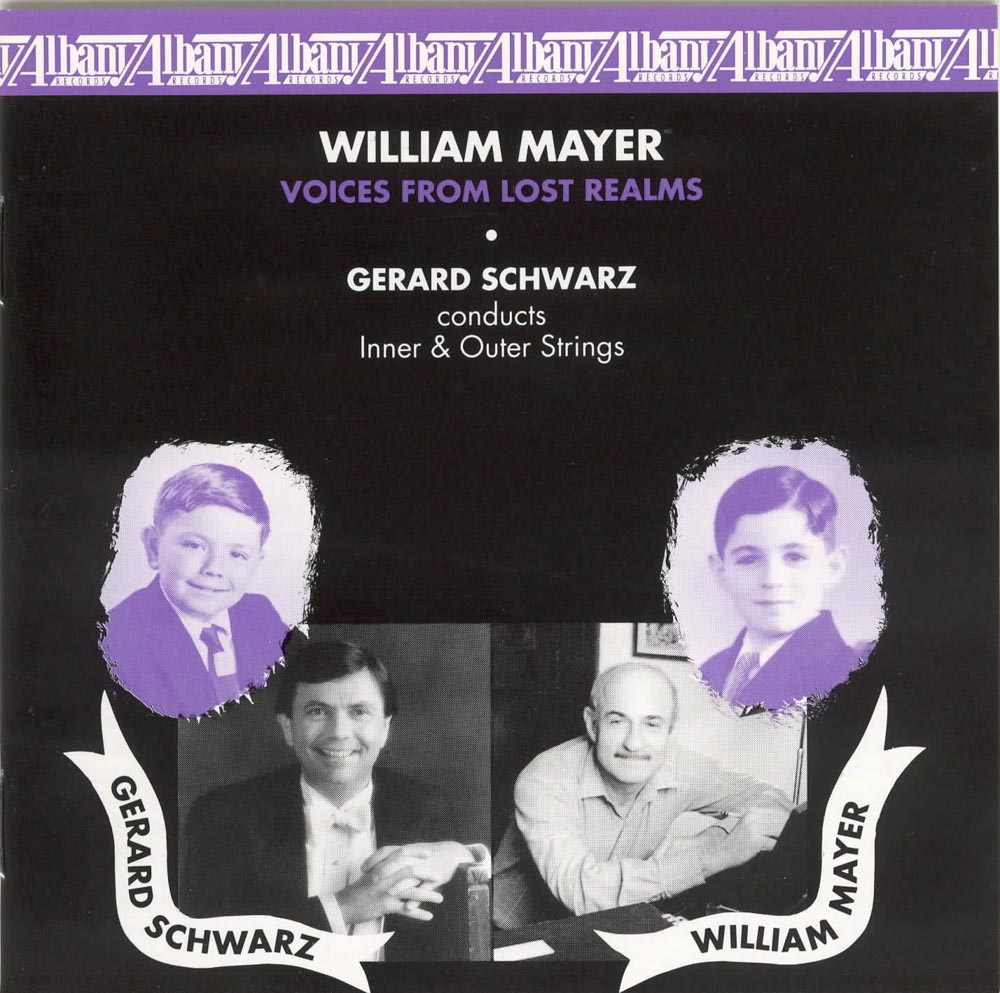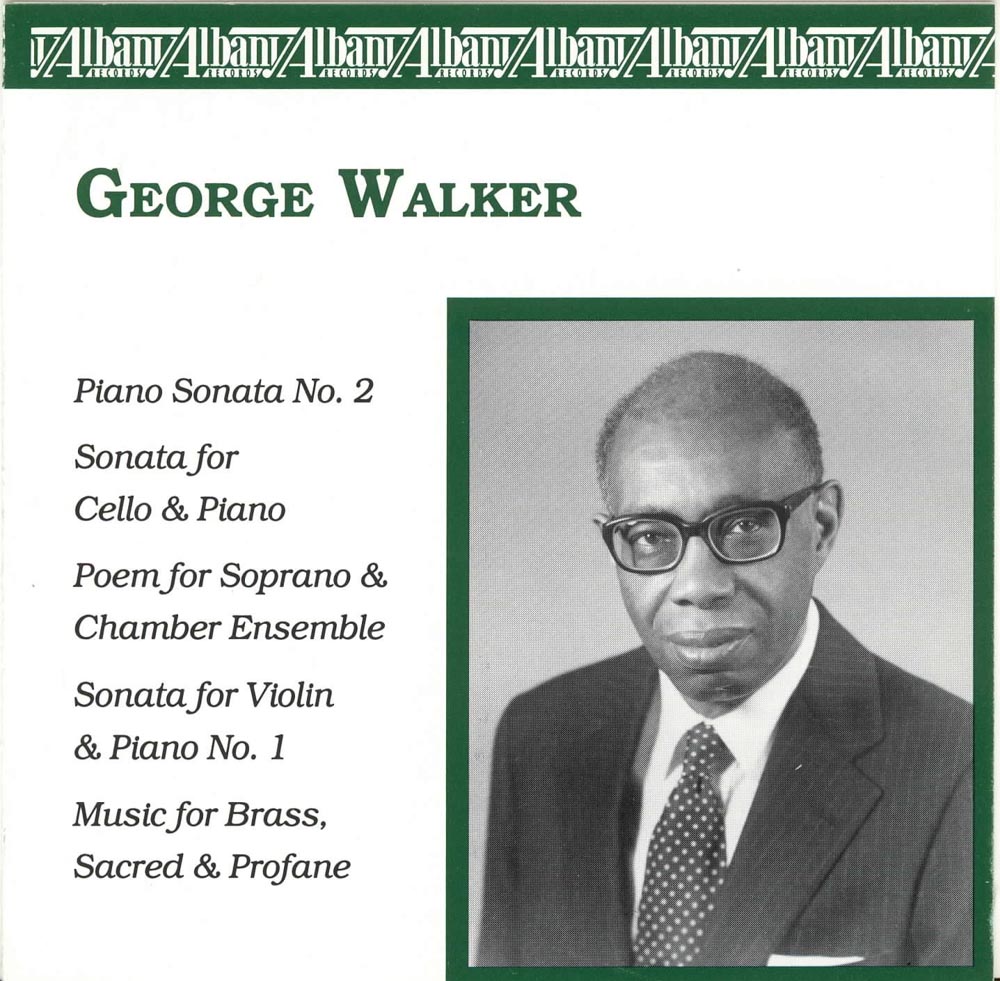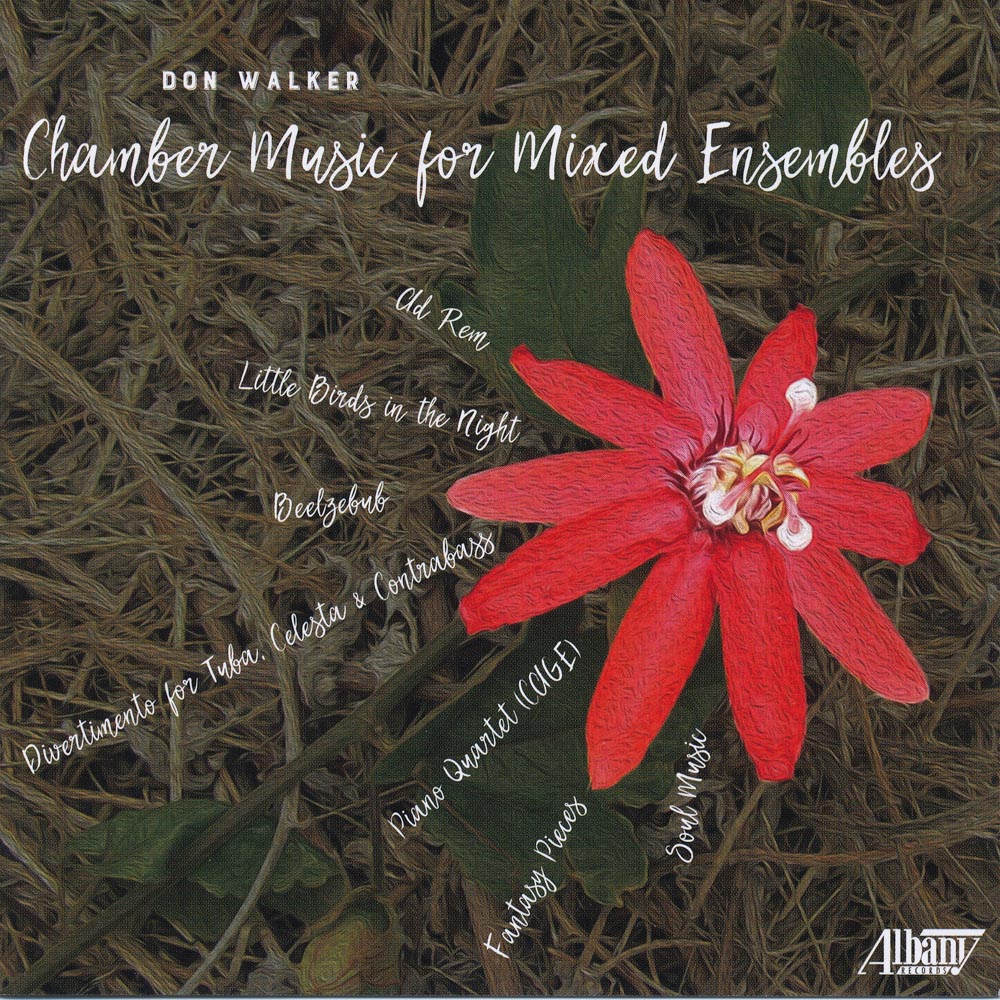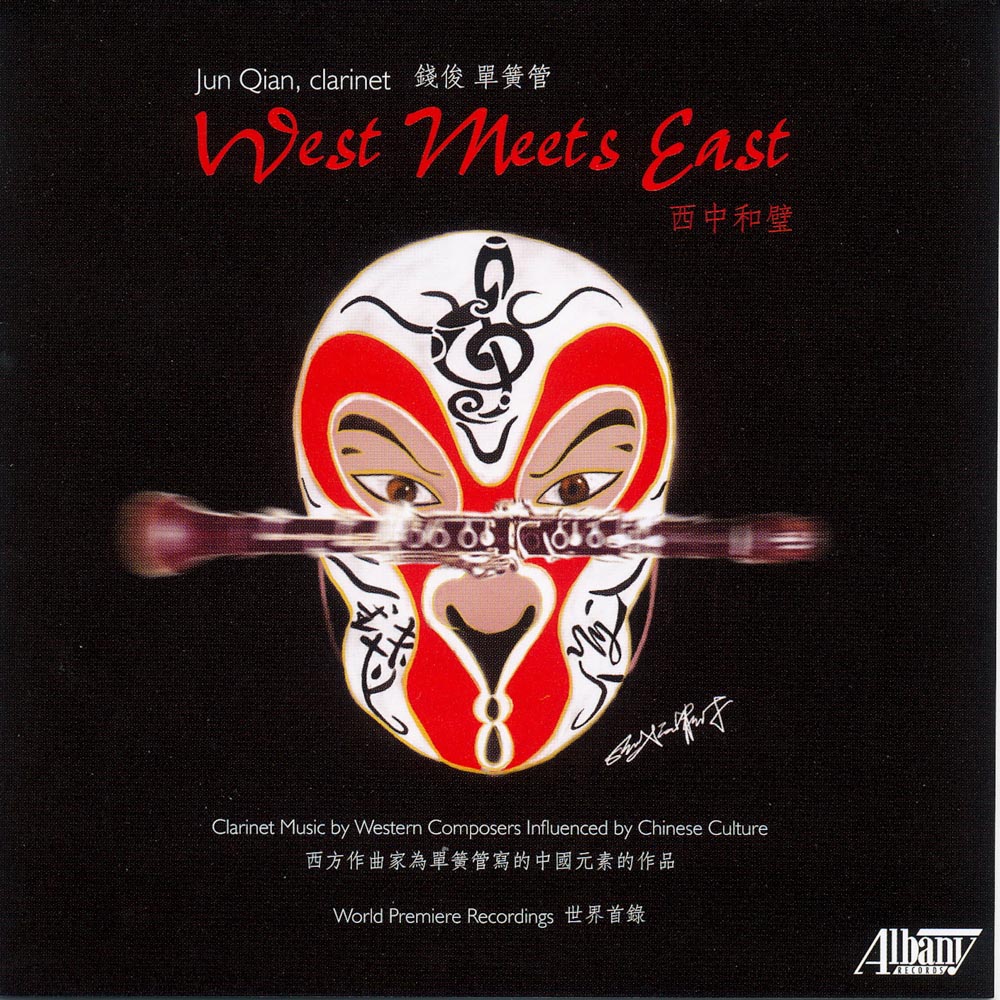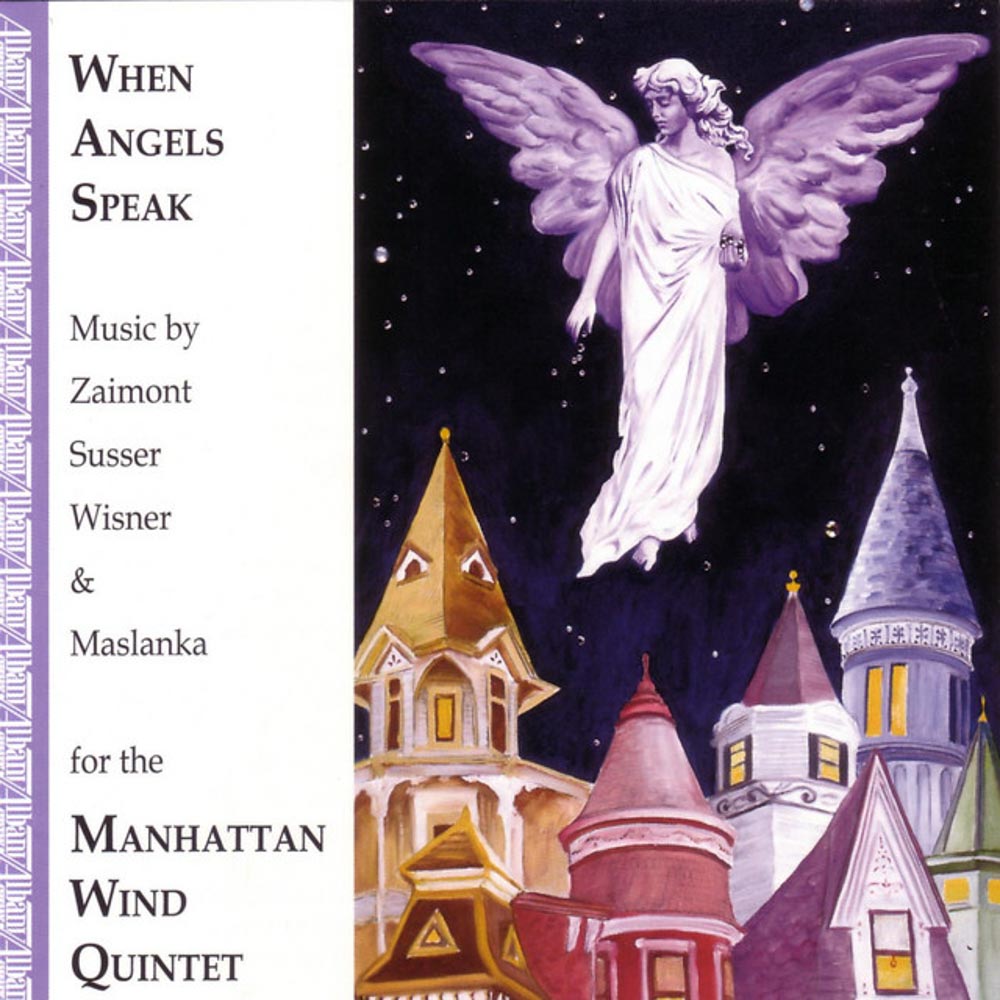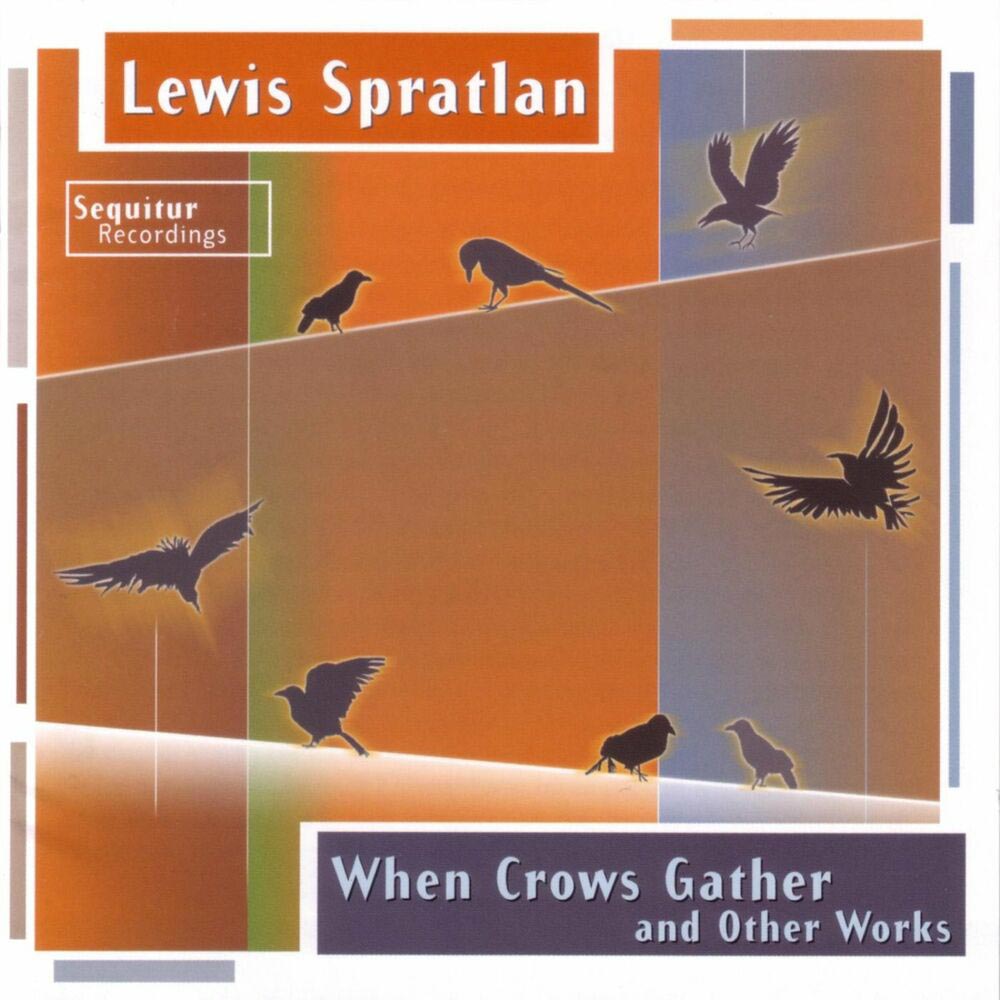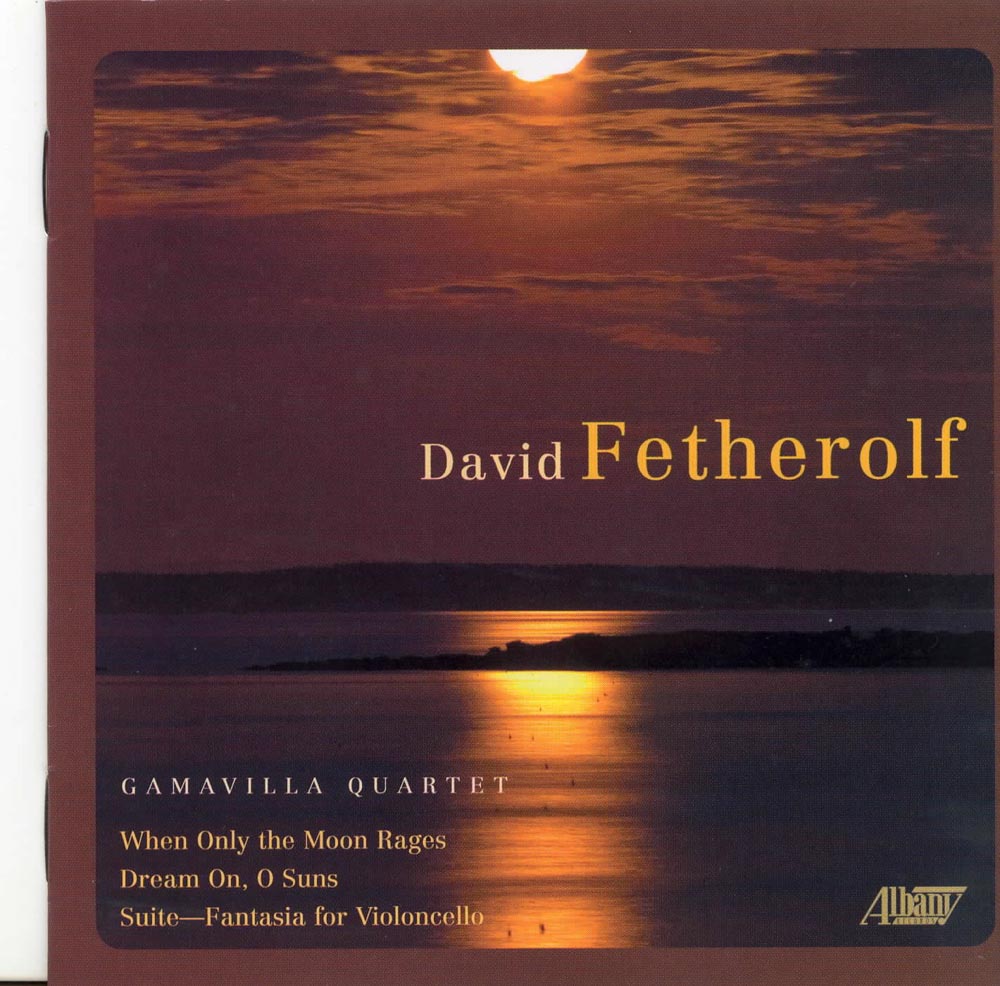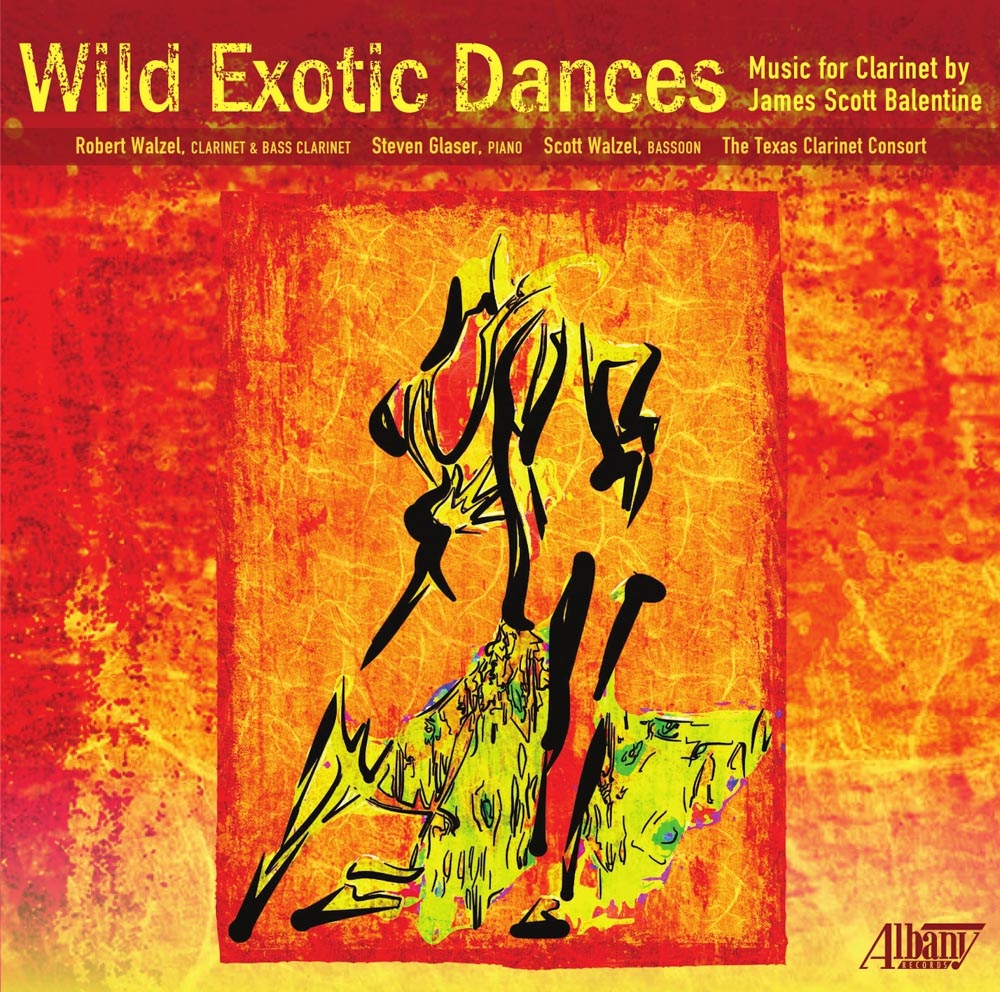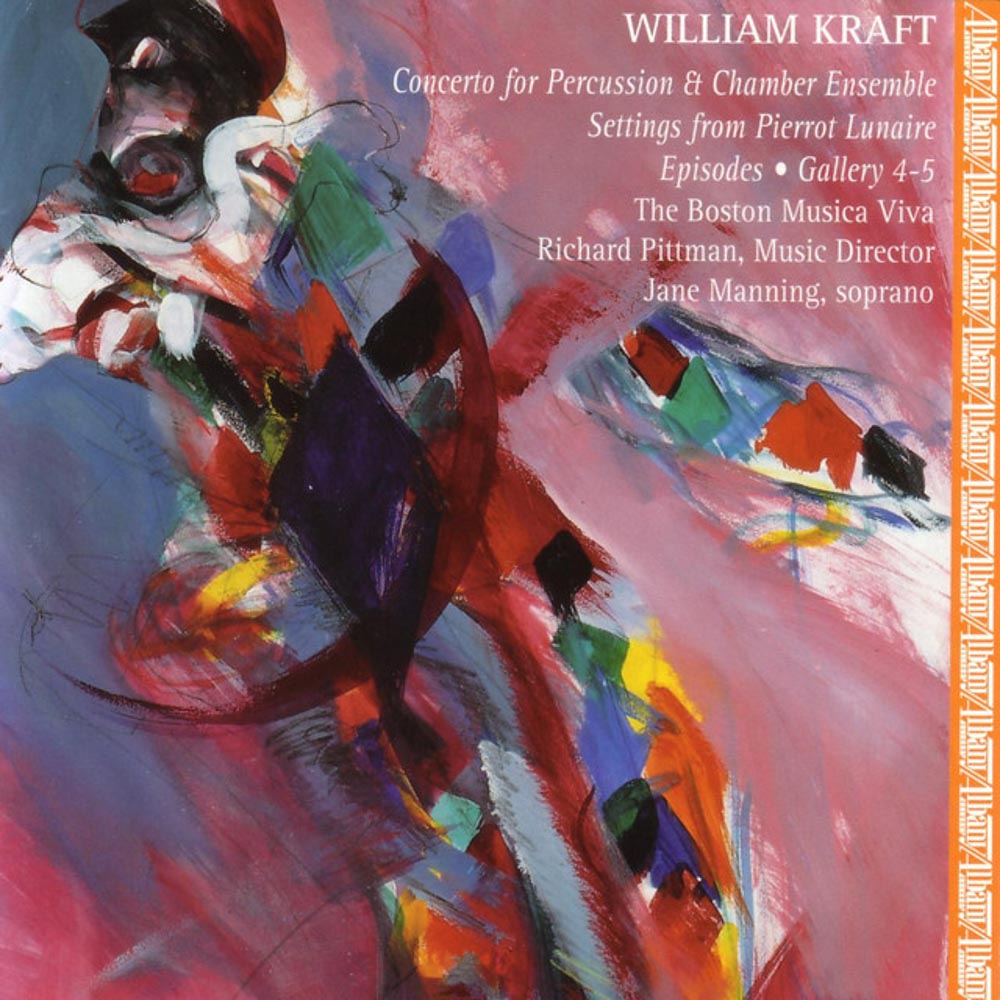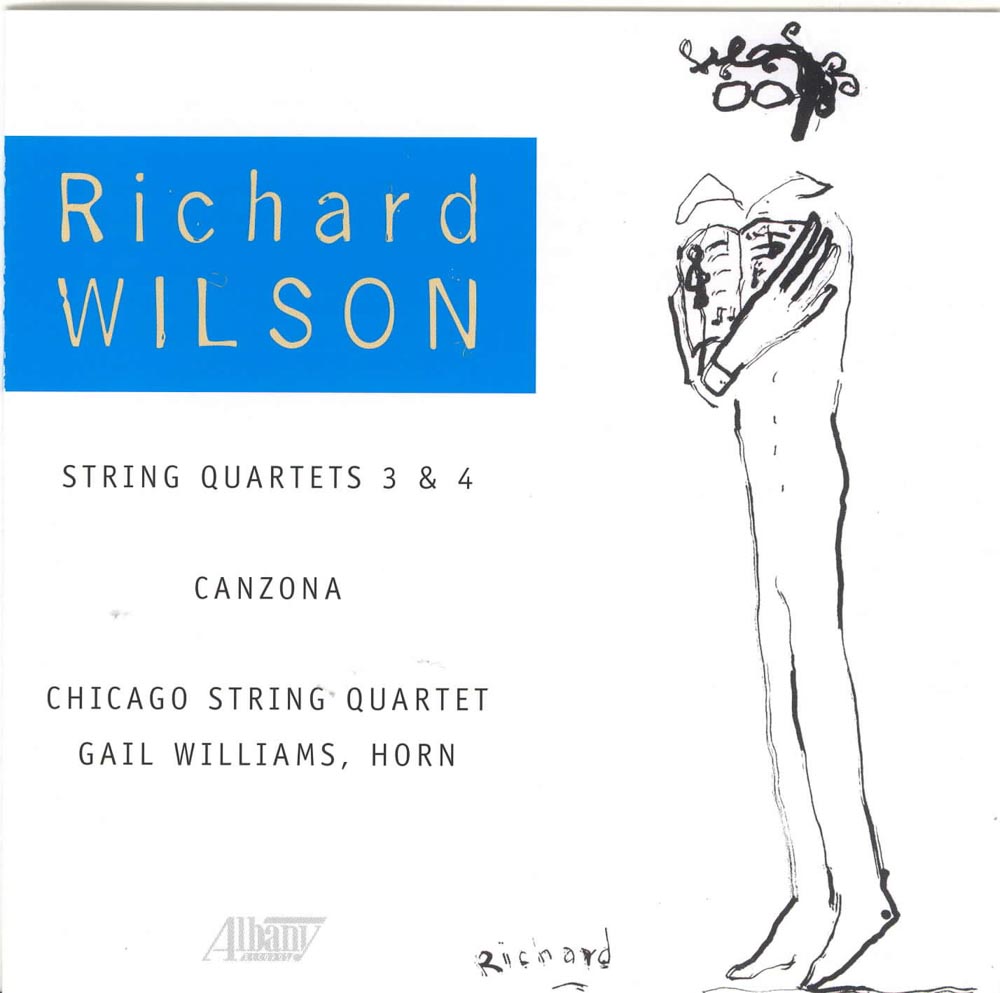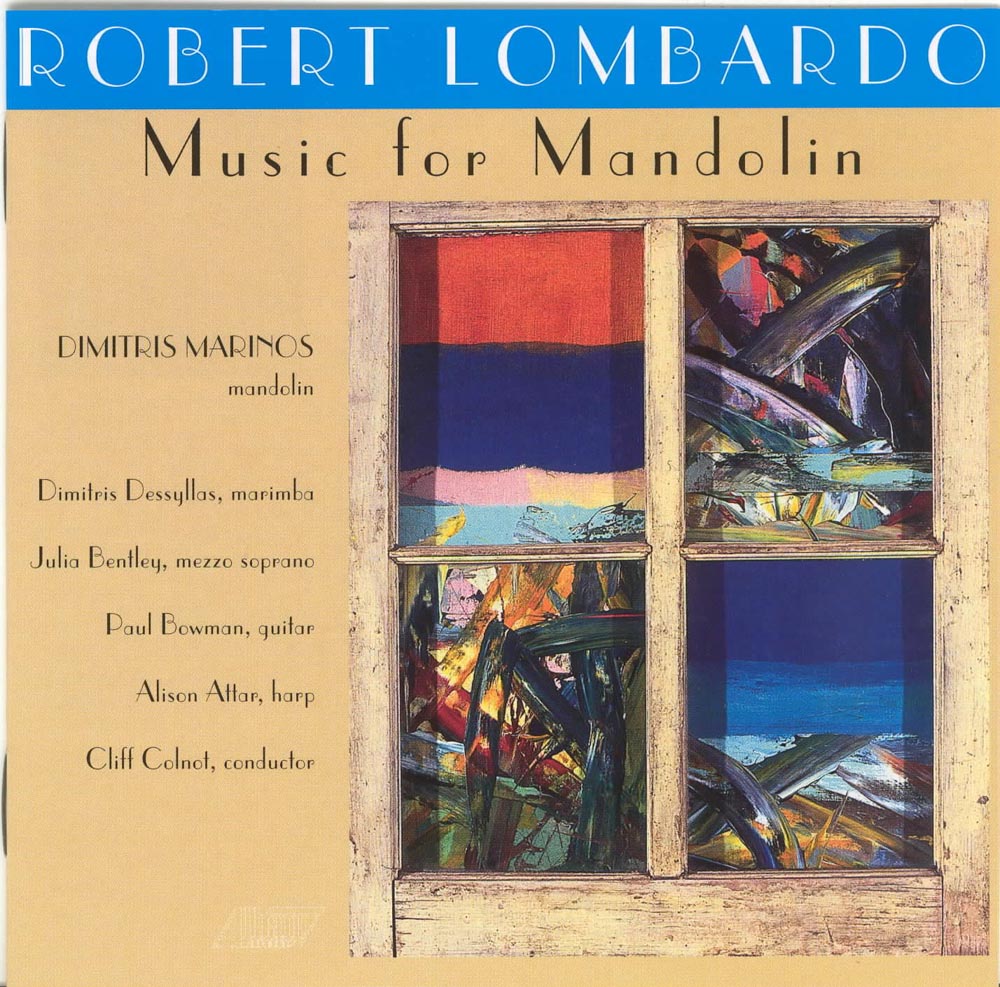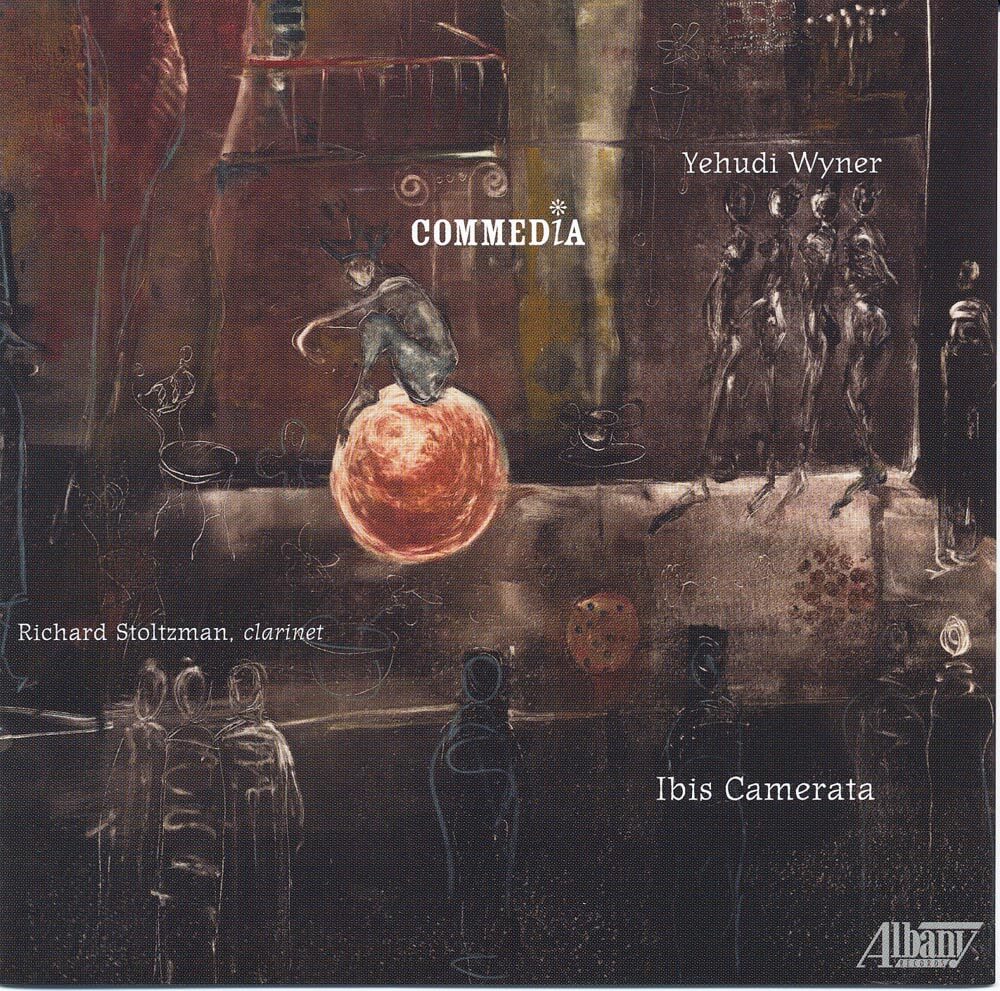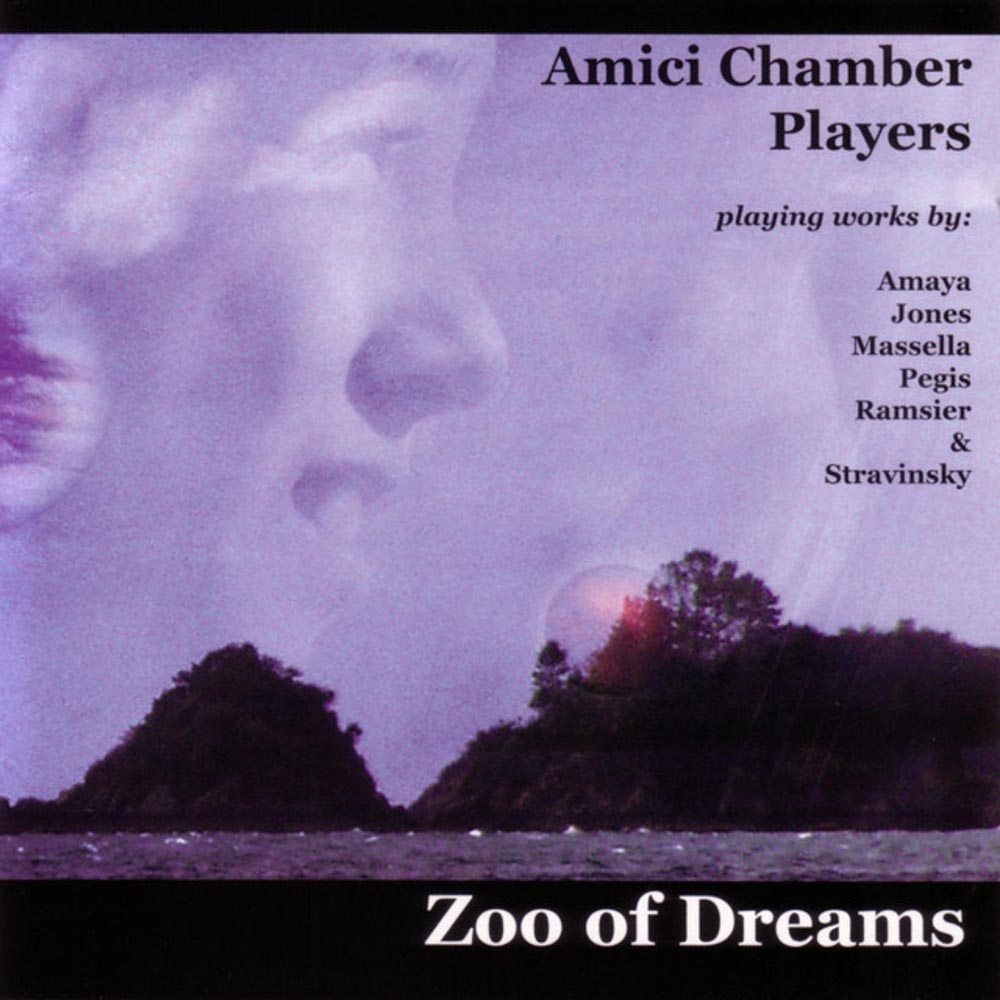Catalog #: TROY1110-11
Release Date: April 1, 2009ChamberViva Concertante! showcases works for chamber orchestra involving soloistic display, and features the Slovak Radio Symphony Orchestra, the Moscow Conservatory Studio for New Music, as well as the University of Iowa's Center for New Music Ensemble. The compositions were either written or revised in the last dozen years. And just as old- and new-world connections are forged by means of the performing groups, a like situation extends to the ethnicity of the composers, with Italian, German, and English contributors as well as Chinese-, German-, Macedonian- and Welsh-Americans.
Catalog #: TROY0068
Release Date: March 1, 1993ChamberThis recording contains some of William Mayer's finest music. "William Mayer's music sings out with real beauty, both in the vocal writing (he is especially known for his operas and songs) and the instrumental settings," wrote John Rockwell of the New York Times on the occasion of the composer's sixtieth birthday. And indeed this recording gives the listener a rich sampling of his vocal music; opera, songs and choral compositions. But, just as importantly, it contains two purely instrumental works - Abandoned Bells for piano and Inner and Outer Strings for string orchestra - which must count as two of the composer's most haunting scores. Mayer's career has contained such memorable events as Mrs. Eleanor Roosevelt narrating his Hello World, a musical trip for orchestra and Leopold Stokowski premiering his Octagon for Piano and Orchestra.
Catalog #: TROY0154
Release Date: March 1, 1995ChamberThis is the third release in Albany Records' continuing series of recordings devoted to the music of the American composer George Walker. This release presents a further selection of Mr. Walker's chamber music. For this recording, Walker is joined by other members of his family who are also performers. His son Gregory, a violinist, is the concertmaster of the Boulder Philharmonic Orchestra. He is also a Professor of Music and Director of Ensembles at the University of Colorado in Denver. He joins his father in a performance of the Violin Sonata No. 1. Ian Walker has pursued a career as an actor, director and producer of numerous theatrical performances. He is the speaker in the Poem for Soprano and Chamber Ensemble.
Catalog #: TROY1668
Release Date: May 1, 2017ChamberDon Walker's second recording for Albany Records features some of his chamber works for mixed ensembles -- ranging from a work for flute, violin, and piano to a piano quartet to larger ensembles such as the last work on the program for flute, bassoon, trumpet, horn, violin, and cello. These compositions also display a range of style with Soul Music containing 12-tone elements combined with a traditional Blues melodic style; to the Piano Quartet where Walker's sense of humor led him to imagine Arnold Schoenberg compositing a twelve-tone piece in honor of John Cage's 100th birthday; to the Divertimento which features a second movement that borrows material from Schubert. Now retired, Don Walker had a distinguished career as a composer, teacher, organist, and archivist.
Catalog #: TROY0155
Release Date: April 1, 1995ChamberThis recording has its impetus in a retrospective concert of Chou Wen-Chung's music that took place at Merkin Concert Hall in New York City on April 1, 1993, in honor of his 70th birthday. Chou was born in China in 1923. He developed an early fascination with music and was educated in the 1920s through the 1940s against a backdrop of upheaval in a country recovering from Western colonialism, Eastern feudalism, and World War II. Urged to help rebuild China, he studied civil engineering instead of music, earning his degree in 1945. He came to the United States in 1946 on a four-year architecture scholarship to Yale. He gave this up to pursue his career in music. He studied with Varese, Martinu, Slonimsky, and Luening, attending the New England Conservatory of Music and Columbia. In 1978, he founded the Center for U.S. China Arts Exchange. It has designed and implemented many far-reaching projects in the arts. Writing in "Contemporary Composers" in 1992, Brian Morton noted: "It is difficult to overestimate Chou Wen-Chung's importance His work is of considerable significance in the slow rapprochement of Western and Eastern musics in the second half of he 20th century." In the New Grove Dictionary of Music and Musicians, Edward Murry wrote, "Chou's music is a remarkably successful fusion of Chinese tradition and sophisticated Western vocabulary and style. Almost all his major works take as points of departure Chinese poetry, painting, calligraphy or philosophical and aesthetic ideas, and he is conscious of his place in the long tradition of Chinese art."
Catalog #: TROY1681
Release Date: November 1, 2017ChamberThe title of this recording explains what it is: West Meets Eastclarinet music by Western composers influenced by Chinese culture. Clarinetist Jun Qian, himself Chinese-American, has long been fascinated with cross-culturalinfluences, as this CD of world premiere recordings so aptly demonstrates. He established the East Meets West Project in 2010 to commission and record new compositions for clarinet that are inspired by Asian cultures and that combine Chinese musical elements with Western art music. This is Qian's third recording for Albany Records, the first two concentrating on Chinese composers influenced by Western culture. A member of the faculty at Baylor University, Jun Qian enjoys an international career as a soloist, recitalist and educator. He studied at Baylor University and the Eastman School of Music.
Catalog #: TROY1420
Release Date: July 1, 2013ChamberA native of Washington, DC, composer and pianist Jessica Krash was awarded a Wammie (Washington Area Music Association's Grammy) in 2010. Her work has been presented in both traditional and experimental settings in New York, Germany, Austria and all the major performance venues and museums in Washington, DC. She lectures on topics of music and the brain, music history and the insights we get from dangerous, banned and provocative music. She is on the faculty at George Washington University and has previously been a faculty member at George Mason University and the Levine School of Music. Se is a graduate of Harvard, Juilliard and the University of Maryland, where she earned her doctorate in composition. The major work on this recording, Be Seeing You, for string quartet and piano, was commissioned by the National Gallery of Art and the National Museum of Women in the Arts and is inspired by 14 depictions of women found in these two museums.
Catalog #: TROY0246
Release Date: August 1, 1997ChamberThe Manhattan Wind Quintet was founded in 1985, while several of its members were earning degrees at the Manhattan School of Music in New York City and playing in the prestigious National Orchestral Association. From the beginning, the ensemble has been active in advancing the cause of new music for winds. It is not surprising then, that this, their first recording, is a collection of contemporary works composed by young Americans with whom they have collaborated over the years. Judith Zaimont composed When Angels Speak during November and December 1987, while she was flat on her back recovering from a broken leg. It is an 11 minute work, in one movement with four large sections. From the beginning it was conceived as an ensemble work, using the five players almost all the time, almost as a miniature band. Since 1992 she has been professor of composition at the University of Minnesota School of Music in Minneapolis. Peter Susser composed his Till Drumlin Waves in 1989. Today he is a member of the faculties of Columbia University and the School of Continuing Education at New York University. The composer Stephen Wisner wrote his Nocturne for Wind Quintet in August 1993 in honor of his mother who had recently died. "My objective was to commemorate my mother with an enjoyable and romantic piece, they type she would have enjoyed. The music of mine that she liked best involved uncomplicated key signatures and pretty melodies. I have incorporated one of her favorite melodies into this Nocturne: the "Children's Prayer" from Humperdinck's Hansel and Gretel." Wisner studied at the University of Michigan with Leslie Bassett and William Bolcom. He is a professional bassoonist. David Maslanka's Quintet No. 2 for Winds was commissioned by the Manhattan Wind Quintet, which gave the work its first performance in 1987 at the Weill Recital Hall in Carnegie Hall in New York City. It has three movements. David Maslanka currently lives and composes on a ranch in Missoula, Montana.
Catalog #: TROY0725
Release Date: February 1, 2005ChamberLewis Spratlan, winner of the Pulitzer Prize in 2000, was born in Miami. His music is performed regularly throughout the United States. A number of works have toured widely, as far afield as Russia and Armenia. Spratlan's work has been supported by fellowships from the Guggenheim and Massachusetts Artists Foundations, the NEA, Tanglewood and the MacDowell Colony. His opera Life is a Dream won a top prize in the Rockefeller Foundation-New England Conservatory Opera Competition and appeared on the New York City Opera's "Showcasing American Opera" series in 2002; his Apollo and Daphne Variations won the New England Composers Orchestra Competition. Among recent works is the one-act opera Earthrise, on a libretto by Constance Congdon, which was commissioned by the San Francisco Opera; a piano quartet commissioned by the Ravinia Festival; and Sojourner for ten players, commissioned for Dinosaur Annex Music Ensemble by the Koussevitzky Music Foundation at the Library of Congress. Since 1970, he has been on the music faculty of Amherst College and has also taught and conducted at Penn State, Tanglewood and the Yale Summer School of Music. It is a great pleasure to welcome this distinguished composer to the Albany Records catalog.
Catalog #: TROY0932
Release Date: June 1, 2007ChamberFetherolf's music has been premiered throughout the Americas and Europe. He writes, "I have a special love for the cello; I started life as a cellist. My first large orchestral work was a Concerto for Cello and Orchestra." His affinity for string instruments is beautifully demonstrated by the renowned members of the Gamavilla Quartet of Moravia.
Catalog #: TROY1547
Release Date: February 1, 2015ChamberComposer by character and performer by temperament, James Scott Balentine brings a complex mix of multicultural and eclectic experiences to his music. Professor of Music at the University of Texas at San Antonio, Balentine has received awards, grants and commissions from the Barlow Endowment, the Opera Guild of San Antonio, and many chamber ensembles and soloists. For this recording, clarinetist Robert Walzel has assembled works for clarinet and piano; clarinet and bassoon; and clarinet ensemble. Most of these works have received performances at the annual ClarinetFest conferences that take place around the world. Performer Robert Walzel has been featured at music festivals and other venues around the world for more than 25 years and was principal clarinet of the Lubbock Symphony Orchestra before becoming Dean of the School of Music at the University of Kansas.
Catalog #: TROY0218
Release Date: January 1, 1997ChamberWilliam Kraft was appointed to the Dorothy and Sherrill C. Corwin Chair in Music Composition at the University of California at Santa Barbara in September, 1991, in recognition of his long and distinguished career as a composer, conductor and teacher. He served as percussionist and timpanist with the Los Angeles Philharmonic from 1955-1981 and he was the Orchestra's first composer-in-residence. He also served as regular guest conductor and was assistant conductor for three seasons. His music has been performed by every major American Orchestra and he has won numerous awards. Established in 1969 by music director Richard Pittman, the Boston Musica Viva is one of the oldest, most distinguished new music ensembles in the United States. With rare exceptions, a new work is premiered at each one of their concerts, usually from an American composer. Jane Manning has long been established internationally as a leading exponent of contemporary music, with more than 300 premieres to her credit. Her extensive discography includes works by Messiaen, Schoenberg and Ligeti, with conductors such as Boulez and Rattle. It is a pleasure for Albany Records to bring you such a distinguished group of performers giving us Mr. Kraft's music. All the works recorded here are world premieres.
Catalog #: TROY0573
Release Date: March 1, 2003ChamberRichard Wilson is the composer of some eighty works in many genres, including opera. A Phi Beta Kappa graduate of Harvard, Mr. Wilson holds the Mary Conover Mellon Chair in Music at Vassar; he is also Composer-in-Residence with the American Symphony Orchestra for which he gives pre-concert talks. He has been a member of the program committee of the Bard Music Festival since its inception. His String Quartet No. 3 was commissioned for the Muir String Quartet by the Walter W. Naumburg Foundation. The Muir gave the first performances at Yale and Vassar in April, 1983 and recorded the work for CRI. In July, 1984, the Delme Quartet gave the London premiere in Wigmore Hall. The String Quartet No. 4 was commissioned for the Chicago String Quartet by the Prince Charitable Trusts and the Chicago Chamber Musicians. The world premiere of the four-movement version took place at the 92nd Street Y, New York City, on January 17, 1998. The five-movement version (the version presented here) was premiered at Vassar College on February 17, 2001. In both instances, The Chicago String Quartet performed. Canzona for Horn and String Quartet was written in 2001 in memory of Luise Vosgerchian, who died in March, 2000. The composer writes: "Ms. Vosgerchian taught music at Harvard for thirty-one years beginning in 1959, the year I became a student there. A charismatic performer, lecturer and mentor, she was an inspiration to hundreds of young musicians at Harvard, Tanglewood and in the Boston area." The work received its first performance at Vassar College on February 8, 2002, by the same performers who have recorded it here.
Catalog #: TROY0611
Release Date: October 1, 2003ChamberRobert Lombardo was born in Hartford, Connecticut to Sicilian immigrants. He graduated with a master's degree in composition from the Hartt School of Music where he studied with Arnold Franchetti. He was awarded a Ph.D. in composition from the State University of Iowa. Lombardo holds the title of Professor Emeritus from Roosevelt University where he was Professor of Theory and Composition and Composer-in-residence from 1965 until 1999. The composer writes: "Although the mandolin has occasionally been used by composers in contemporary literature, e.g., Schoenberg, Stravinsky and Crumb, I always thought of the instrument in the folk category. About a dozen years ago, my perception of the use of the mandolin changed. In 1991, Dimitris Marinos, a student who recently arrived from Greece, came to my studio at Roosevelt University for his first composition lesson. He had a mandolin case tucked under his arm. After his lesson, I was curious and asked him if he wouldn't mind playing his mandolin for me. I guess I expected him to play a folk tune, and was pleasantly surprised - amazed would be a better word - when he played a very complex work replete with multiple stops, fast chromatic passages that covered the entire range of the instrument - in an apparent effortless fashion. I was captivated by this young man's musicality and virtuosity. After he showed me some of the instrument's technical capabilities, I thought about writing a short composition for him." That is the origin of how the compositions that appear on this disc came about.
Catalog #: TROY1254
Release Date: March 1, 2011ChamberIt was Biljana Milovanovic, pianist for the Ibis Camerata ensemble, who conceived this project of recording a group of compositions by Yehudi Wyner. Mr. Wyner performed in one piece (with Richard Stoltzman) and conducted another, but his major contribution was in coaching performers in matters of his style. The music spans 50 years of Wyner's compositional output beginning with the Partita for Piano of 1952 and arriving at Commedia for Clarinet and Piano of 2002. Awarded the Pulitzer Prize in 2006, Yehudi Wyner is one of America's most versatile musicians. His compositions include more than 60 works and he has received many commissions and honors in addition to the Pulitzer. He has taught at Yale, SUNY Purchase, Cornell, Harvard and Brandeis. This is the fourth recording by the Ibis Camerata to appear on Albany Records.
Catalog #: TROY0647
Release Date: March 1, 2004ChamberChristopher Pegis, cellist is the founder and Artistic Director of Amici Chamber Players and a cellist with the Florida String Quartet. He writes: "This recording is in many ways a product of my large extended musical family, my work with the Florida West Coast Symphony, and indeed the very nature of creative collaborations. Although it was not planned this way, the performers and composers are all linked to one another in some way by family, friendship and work. I was lucky to have met Soulima Stravinsky and his wife, Francoise, and was involved in earlier recordings and performances of his music before they both passed away. Through the Stravinskys, a link was made to his father Igor and to fellow composer Charles Jones. Although my memory of this is dim, apparently I did shake Jones' hand at a reception in New York City following my ensemble's concert to honor Soulima's chamber music compositions. Thomas Massella and Efrain Amaya are former college classmates of myself and my wife, respectively; Paul Ramsier came to us via the Florida West Coast Symphony and his collaborations with Symphony bassist John Miller. When we started to physically record this music, we jointly decided to try to avoid cutting and splicing at all costs. Our aim was to impart the excitement and sweep of a live performance to our audience. This put extra pressure on all of the performers, but the result is that what you are hearing is 98% splice free from beginning to end. In fact, nine of the eleven compositions are complete takes from start to finish."
Catalog

©2024 Albany Records. All rights reserved. | Privacy Policy | Website by PARMA Creative.
